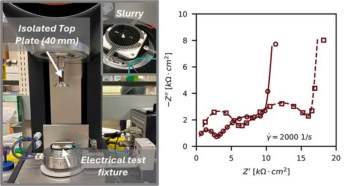Available to watch now, The Electrochemical Society in partnership with Hiden Analytical, Scribner and Gamry Instruments, explore the benefits and economics of hydrogen within our energy system
Want to learn more on this subject?
 Please forgive the pun, but the research and deployment world of hydrogen has exploded lately. Much like the 2010s were the decade of wind and solar, the 2020s are setting up to be the decade of hydrogen. It is no longer whether hydrogen will be part of a sustainable energy system solution, but rather how large a role hydrogen will play in a clean, sustainable energy system for the planet.
Please forgive the pun, but the research and deployment world of hydrogen has exploded lately. Much like the 2010s were the decade of wind and solar, the 2020s are setting up to be the decade of hydrogen. It is no longer whether hydrogen will be part of a sustainable energy system solution, but rather how large a role hydrogen will play in a clean, sustainable energy system for the planet.
This webinar highlights the role of hydrogen in a clean energy system; and why it is such a unique and critical element enabling greater renewable energy use while permitting end-use applications to be performed more cleanly and efficiently – also referred to as the H2@Scale vision.
Also discussed is how this vision is being made economically more viable by shifting cost structures and environmental driving forces. One of the primary challenges for hydrogen has always been getting to scale which can enable economic parity/viability. The challenges in getting to a gigaton scale are presented. The Electrochemical Society has a special role in the hydrogen space due to the unique electrochemical characteristics of hydrogen, which are discussed in terms of areas of R&D needs within the hydrogen space.
Want to learn more on this subject?
Bryan Pivovar is senior research fellow and electrochemical engineering and materials chemistry group manager in the Chemistry and Nanosciences Center at the National Renewable Energy Laboratory (NREL) where he oversees electrolysis and fuel cell and materials R&D. A pioneer in several areas of fuel cell development, he took on leadership roles and organized workshops in the areas of subfreezing effects, alkaline membrane fuel cells (2006, 2011, 2016 and 2019), and renewable hydrogen at the gigaton scale (2019). Pivovar was recently named director of a major US Department of Energy Consortium (minimum of $50m over five years), H2NEW (Hydrogen [H2] from Next-generation Electrolyzers of Water). The consortium focuses on addressing components, materials integration and manufacturing R&D to enable manufacturable electrolyzers that meet required cost, durability and performance targets simultaneously, in order to enable $2/kg hydrogen.
He received his PhD in chemical engineering from the University of Minnesota. Prior to joining NREL, he led fuel cell R&D at Los Alamos National Laboratory. The co-author of more than 150 papers with more than 10,000 citations in the general area of fuel cells and electrolysis, he received the 2021 ECS Energy Technology Division Research Award and 2012 ECS Tobias Young Investigator Award.








